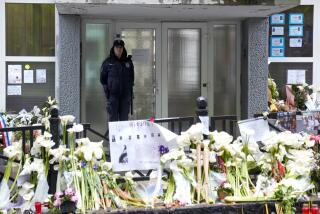Moving Beyond a Paper Peace
- Share via
Card by card, the Clinton Administration is adding some substance to the flimsy house that constitutes the Muslim-Croat half of the future Bosnia. The two factions, bloody foes in 1992-93 battles over the fractured country, have now joined forces in a single army, and Washington has agreed to arm it, part of the Balkan balancing act of American diplomacy.
With the Bosnian Serbs still holding the edge in military power in Bosnia-Herzegovina, the prospects for turning a paper peace into grudging acceptance depends on the Muslim-Croat entity being sufficiently armed to resist intimidation. The White House has been ready to supply arms for some time, but first the Muslims had to agree on a joint military command with the Croats. More important, the Muslims had to agree to meet a key requirement of the Dayton peace accord by sending home a sizable force of Iranian militiamen who had come to their aid, much to Washington’s discomfort.
That decision was finally taken by Bosnian President Alija Izetbegovic a few weeks ago, and President Clinton announced this week he was ready to open the arms tap. At least $100 million in weapons and equipment would be delivered from U.S. stockpiles to the new Muslim-Croat command. It is expected to be first-rate stuff: tanks, personnel carriers, helicopters, antitank weapons. Training on the equipment will be provided by MPRI, an Alexandria, Va., company using former U.S. military officers, which gives the Administration a bit, but not much, cover for what is clearly a U.S. intervention, one pushed through despite some opposition from Washington’s European allies who are uncomfortable with any additional arms flowing into Bosnia.
In addition, the Muslim-Croat army would be getting $140 million in pledges of aid and equipment from Saudi Arabia, Kuwait, Egypt and Turkey, which are acceptable Muslim allies of Washington; Iran, which supplied the Bosnian Muslims during the war with a wink from the Clinton Administration, clearly is not.
This is all part of the balancing act by outside powers as Bosnia moves toward elections in September, which will establish a national government and separate Serbian and Muslim-Croat entities. With better balanced military forces, political solutions become more likely, though some, like resolution of the bitter human rights and war crimes issues, will be difficult. Nothing is easy in Bosnia, but this makes sense.
More to Read
Sign up for Essential California
The most important California stories and recommendations in your inbox every morning.
You may occasionally receive promotional content from the Los Angeles Times.













